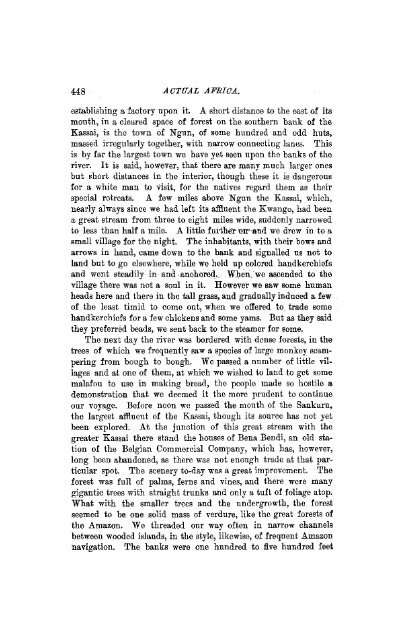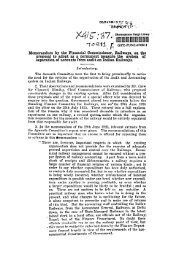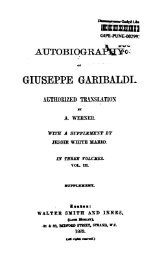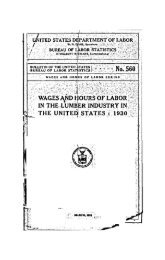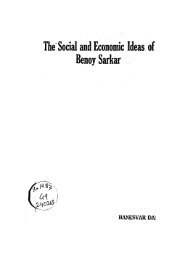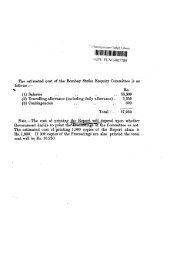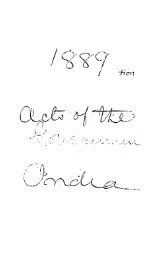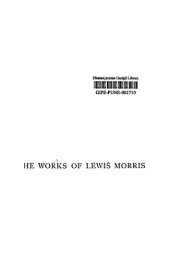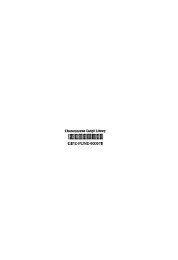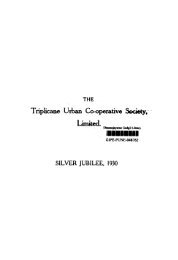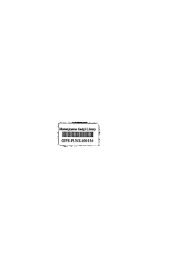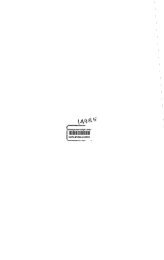- Page 2 and 3:
ACTUAL AFR~ OR, THE COMING CONTINEN
- Page 4 and 5:
DBDIC.l.TKD. BY 8PBCUL PBBIlISSlOJl
- Page 6 and 7:
vi PREFACE. isation. Only the tropi
- Page 8 and 9:
viii ANALYTICAL TABLE OF' CONTJ::NT
- Page 10 and 11:
x ANALYTICAL TABLE OF OONTENTS. Ins
- Page 12 and 13:
xii ANALYTIC~L TABLE OF CONTEN1'S.
- Page 14 and 15:
xiv ANA.LYTIOAL TABLE OF OOIt'1'EN1
- Page 16 and 17:
xvi ANALYTJOAL TABLE OF OONTlJ.'NTS
- Page 18 and 19:
xviii ANALYTIOAL TABLE OF OONTEN7'S
- Page 20 and 21:
ACTUAL AFRICA. CHAPTER I. TANGIBB.
- Page 23 and 24:
TANGIER. 3 of air and scene and an
- Page 25 and 26:
TANGIER. 5 The best shops of Tangie
- Page 27 and 28:
T.ANGIER. eignere, but he wss tied"
- Page 29 and 30:
INTO THE LAN/) OF THE MOOll8. 9 abo
- Page 31 and 32:
INTO THE LA.ND OF THE MOORS. 11 tom
- Page 33 and 34:
INTO TlIE UND OF THE MOORS. 13 vari
- Page 35 and 36:
INTO THB L.A.ND OF THB 1fOORB. 15.
- Page 37 and 38:
CHAPTER III. TOWN AND TRAOK. THill
- Page 39 and 40:
TOWN .AND TRACK. 19 galleries of th
- Page 41 and 42:
TOWN .AND TRAOK. 21 its treelessnes
- Page 43 and 44:
TOWN AND TRAOK. 23 sight to behold
- Page 45 and 46:
TOWN AND TRAOK. 25 Gueunaoui by the
- Page 47 and 48:
OHAPTER IV. lIEQUINEZ. WE passed th
- Page 49 and 50:
MEQUINEZ. 29 secured with a key. Th
- Page 51 and 52:
. . MEQUINEZ. 31 itself in the sout
- Page 53 and 54:
MEQUINEZ. ilil women and children B
- Page 55 and 56:
MEQUINEZ. of pounds of warmroastmnt
- Page 57 and 58:
(Jeneral View of Fu.
- Page 59 and 60:
38 AOTUAL AFRIOA. house of Omar Bar
- Page 61 and 62:
40 AOTUAL AFRIOA. abroad after that
- Page 63 and 64:
42 AOTUAL AFRIOA. subjects, that th
- Page 65 and 66:
A.OTUA.L A.FRIOA.. Sultan had been
- Page 67 and 68:
CHAPTER VL A HOLY OITY. AT three o'
- Page 69 and 70:
48 .AOTU.AL .AFRIO.J.. plain and th
- Page 71:
50 .A.OTU.iJ.L AFRIO.iJ.. Egypt. Th
- Page 74 and 75:
52 .4. OTU.4.L .4.FRIO.4.. not gene
- Page 76 and 77:
54 AOTUAL AFRIOA. outstretched with
- Page 78 and 79:
56 -A (JTU-AL -AFRI(J-A. so high th
- Page 80 and 81:
58 .A(JTU.AL .AFRI(J.A. heights, by
- Page 82 and 83:
CHAPTER VIIL TlIB APlIICAlil GRAlil
- Page 84 and 85:
62 A OTUAL AFRIOA. ture, with their
- Page 86 and 87:
64 ACTUAL AFRIOA.. The mosque is su
- Page 88 and 89:
66 .A OTU.AL .AFRICA.. groves. The
- Page 90 and 91:
CHAPTER IX. THB "WHITE CITY." ON No
- Page 92 and 93:
'TO AOTUAL AFRIOA. the station of w
- Page 94 and 95:
72 .t10TU.t1L .t1FRlO.t1. trees and
- Page 96 and 97:
74 AOTUAL AFRIOA. and have a centra
- Page 98 and 99:
THE "WlllTE OITY." '15 about him au
- Page 100 and 101:
THE "WHITE OITY." 77 And this they
- Page 102 and 103:
THE "WHITE (JITY." 79 the northwest
- Page 104 and 105:
CHAPTER X. THE GOBGE 01' THE CHABm.
- Page 106 and 107:
THE GORGE OF THE CHA.BET. 83 vol te
- Page 108 and 109:
THE GORGE OF THE (JHABET. 85 The re
- Page 110 and 111:
FielD in tAo CAMet .1 .itltm.
- Page 112 and 113:
88 .AOTU.AL .A..FRIO.A.. from the s
- Page 114:
CHAPTER XL OONSTANTINE. THE followi
- Page 117 and 118:
92 AOTUAL .A.FRIOA. and arsenal, bu
- Page 119:
94 .AOTUAL .AFRIOA. Mansonrah, cove
- Page 122 and 123:
96 AOTUAL AFRIOA. apple trees. Ther
- Page 124 and 125:
, CHAPTER XII. BISKRA-QUEEN 01' THE
- Page 126 and 127:
BISKRA-QUEEN OF THE DESERT. 99 whic
- Page 129 and 130:
BISKlU-QUEEN OF THE DESERT. 101 In
- Page 131 and 132:
BISKRA.-QUEEN OF THE DESERT. 103 88
- Page 134 and 135:
BISKRA-QUEEN OF THE DESERT. 105 gre
- Page 136 and 137:
CHAPTER XIIL AN ALGBBIAN POMPBn. ON
- Page 139 and 140:
.AN.ALrJEBI.AN POMPEIL 109 scriptio
- Page 141 and 142:
.4.N .4.LGERIAN POMPEIL 111 large c
- Page 143 and 144:
AN ALGERIAN POMPEIL 113 one of them
- Page 146 and 147:
TUNIS AND OARTHAGE. 115 of ground e
- Page 148 and 149:
TUNIS AND OARTHAGE. II!II the women
- Page 150 and 151:
TUNIS AND OARTHAGB. 119 which the b
- Page 153 and 154:
TUNIS .AND OARTHAGE. 121 palace hav
- Page 155 and 156:
TUNIS .AND (J-AllTH-AGE. 123 orient
- Page 157 and 158:
II. H. 1M Bq of Tv .....
- Page 159:
126 AOTUAL AFRIOA.. ment, from one
- Page 162:
128 AOTUAL AFRIOA. see everything o
- Page 165 and 166:
130 ..t1 (JTU..t1L ..t1FRI(J..t1. c
- Page 167 and 168:
132 ACTUAL .AFRICA. Algeria, with a
- Page 169 and 170:
134 .40TU.4L .4FRIO.4. island is co
- Page 171:
136 AOTUAL AFRIOA. BOught for in Eu
- Page 174 and 175:
138 AOTUAL AFRIOA. vilayet of the O
- Page 176 and 177:
140 AOTUAL AFRIOA. have the mosque
- Page 178 and 179:
TRIPOLI. 141 are all in a half ruin
- Page 181 and 182:
TRIPOLI. 143 habitants. An article
- Page 183 and 184:
H. H. IAe IWiIJe 01 E9fp1.
- Page 185 and 186:
146 ACTUAL AFllIOA. All the British
- Page 187 and 188:
• 148 AOTUAL AFRIOA. old tombs. F
- Page 189 and 190:
150 AOTUAL AFRIOA. appears very nea
- Page 191 and 192:
CHAPTER XVIII. APLOAT UPON THE NILE
- Page 193 and 194:
154 AOTUAL AFRIOA.. The river where
- Page 195 and 196:
156 .&OTU.&L .A.FRIO.A.. and outcry
- Page 197 and 198:
158 A(JTUAL OR/(JA. only a kilt of
- Page 199 and 200:
160 A OTUAL AFllIOA. great quantiti
- Page 201 and 202:
162 ACTUAL AFRICA.. the authorities
- Page 203 and 204:
164 .ACTU.A.L .A.FIlIC.A.. Cairo),
- Page 205 and 206:
166 .d. (JTU.d.L .d.FRI(J.d.. Arabi
- Page 207 and 208:
168 .A.OTU.A.L .A.FRIO.A.. to vie.
- Page 209 and 210:
170 .AOTU.AL .AFRIOA. membered, rea
- Page 211 and 212:
CHAPTER XX. THE TEMPLE OP DENDEBAH.
- Page 213 and 214:
TUb' TEMPLE OF DENDERAH. 173 and Ne
- Page 215 and 216:
THE TEMPLE OF DE1WERAH. 175 • god
- Page 217 and 218:
THE TEMPLE OF DENDEl1A.H. 17'1' tra
- Page 219 and 220:
THE TEMPLE OF DENDERAH. 179 Egyptia
- Page 221 and 222:
HMd 01 RaIHtlU 1/ •• G«ol, lro
- Page 223 and 224:
182 AOTUAL AFRIOA. having jnst seen
- Page 225 and 226:
184 .A.OTU.A.L .A.FR10.A. treaty of
- Page 227:
186 ACTUAL AFRICA. terial. Still we
- Page 230 and 231:
188 AOTU.AL AFRIOA. Mut and Chonsu.
- Page 232 and 233:
190 .40TU.4L .4PRIO.4. ing depressi
- Page 234 and 235:
192 AOTUAL AFRICA. has not yet been
- Page 236 and 237:
194 .ACTUAL .APllIC.A. of sand, rub
- Page 238 and 239:
THE FIRST OATARAOT. 195 the town, o
- Page 241 and 242:
THE FIRST OATARAOT. 197 750 broad.
- Page 243 and 244:
THE FIRST CATARACT. 199 the stream.
- Page 245 and 246:
IN LOWER NUBI.A. 201 turn voyage to
- Page 247 and 248:
IN LOWER NUBIA. 203 land, though ve
- Page 250 and 251:
IN LO WEB. NUBIA. 205 At about five
- Page 252 and 253:
IN LOWER NUBIA. 207 of having once
- Page 254 and 255:
IN LOWER NUBIA.. 209 nages were of
- Page 257 and 258:
IN LOWER NUBIA, 211 life of the var
- Page 259 and 260:
IN LOWER NUBIA. 213 kings of Egypt,
- Page 262 and 263:
MAURITIUS AND MADA(}A8(JAIl. 215 Ca
- Page 265 and 266:
M.A. URITIUS .A.N)) M.A.)).A. G .A.
- Page 267 and 268:
MAURITIUS AND MADAGASOAR. 219 Bulat
- Page 269 and 270:
The Governor 01 7amatave (lnd his F
- Page 271 and 272:
CHAPTER XXV. DOWN TBB COAST. FOB a
- Page 273 and 274:
DOWN THE OO.d.ST. 223 money current
- Page 276 and 277:
DO WN THE COAST. 225 most of the vi
- Page 279 and 280:
DOWN THE OOAST. 227 made by continu
- Page 281 and 282:
DOWN THE OOMl: 229 tance from here
- Page 284 and 285:
OVER THE MOUNTAIN TERRAOE8. Ulll re
- Page 286 and 287:
OVER THE MOUNT .. UN TERlUCE8. 233
- Page 288 and 289:
OVER THE MOUNT.ilN TERRAOEB. 235 th
- Page 290 and 291:
OVER THE MOUNTAIN TERRA(JES. 237 ma
- Page 292 and 293:
OVER THE MOUNTAIN TERRAOES. 239 gra
- Page 294 and 295:
CHAPTER XXVII. ANTANANARIVO. ONE of
- Page 297 and 298:
ANTANANARIVO. 243 streets after thi
- Page 300 and 301:
.A.NTANANAlllVO. 245 artificial. In
- Page 302 and 303:
~'·ati'r.~ .'WAdi",...
- Page 304 and 305:
248 AOTUAL AFRIOA. acter of bis tro
- Page 306 and 307:
250 AOTUAL AFRIOA. the largest ostr
- Page 308 and 309:
CHAPTER XXVIIL JOURNEY TO THE WEST
- Page 310 and 311:
JOU~EY TO THE WEST OOAS~ 253 the gr
- Page 312 and 313:
JOURNEY TO THE WEST COAST. 255 The
- Page 314 and 315:
JOURNEY TO THE WEST OOA.BT. 257 two
- Page 316 and 317:
JOURNEY TO THE WEST OOAST. 259 been
- Page 318 and 319:
CHAPTER XXIX. A VISIT TO A GOLD 1II
- Page 320 and 321:
.A. VISIT TO .A. ·GOLD MINE. 263 m
- Page 322 and 323:
.A VISIT TO .A GOLD !LINE. 265 draf
- Page 324 and 325:
.4 VISIT TO .4 GOLD MIl'1E. 267 veg
- Page 327 and 328:
.A VISIT TO.A GOLD HINE. 269 work.
- Page 329 and 330:
CHAPTER XXX. HADAGASCAR TO ZANZIBAR
- Page 331 and 332:
MA.D.A9.ASO.AR TO Z.ANZIB.J.R. 273
- Page 333 and 334:
MADAGASO.ill TO ZANZIBAR. 275 menta
- Page 335 and 336:
.J. Olow PZa.ntation, Zanzibar.
- Page 337:
278 ACTUAL AFR/oA. diminished but n
- Page 340 and 341:
280 AOTUAL AFRICA. Suaheli Iluently
- Page 342 and 343:
282 AOTUAL AFRIOA. for his gracious
- Page 344 and 345:
CHAPTER XXXI. GERMAN EAST AFRICA. B
- Page 346 and 347:
(JERMAN EAST AFRIOA. 285 been haJf
- Page 349 and 350:
(JERJUN EAST AFRIOA. 287 just at th
- Page 351 and 352:
GERJUN E.AST .A.FRIO.A. 289 the bay
- Page 354 and 355:
CHAPTER XXXII. 1I0ZAIIBIQUB AND LOR
- Page 356 and 357:
MOZAMBIQUE .AND LORENZO M.t1RQUEZ.
- Page 358 and 359:
JlOZAMBIQUB Al!1D LORBNZO JlARQUBZ.
- Page 361 and 362:
MOZ.AMBIQUE .AND LORENZO M.ARQUEZ.
- Page 363 and 364:
TIlt: Pri~t:ipal St,oed of Durban..
- Page 365 and 366:
300 -AOTU-AL -AFRIO-A. farming and
- Page 367 and 368:
30ll AOTUAL AFRIOA. broken characte
- Page 369 and 370:
NATAL. 303 flimsy construction, and
- Page 372 and 373:
NAT.AL. 305 their pasture at stated
- Page 375 and 376:
CHAPTER XXXIV. JOHANNIIiSBUIIiG-Tll
- Page 378 and 379:
JOlLANNESBURfJ-THB CITY OF GOLD. 30
- Page 381 and 382:
JOlU1!lNESBURG-THE OITY OF (JOLI).
- Page 384 and 385:
JOHANNESBURG-THE OITY OF GOLD. 313
- Page 386 and 387:
CHAPTER XXXV. THE DIAMOND DISTRICT.
- Page 388 and 389:
Kimberlev Mine, 1873.
- Page 390 and 391:
318 A.(JTUA.L .AFRI(JA.. to tens of
- Page 392 and 393:
TIlE DUMOND DISTllI(J!J'. 819 or tw
- Page 395 and 396:
THE DIAMOND DISTRIOT. 321 the Cape
- Page 398 and 399:
CHAPTER XXXVI. OAPE TOWN. CUE TOWN
- Page 401 and 402:
CAPE TOWN. 325 lofty, with flat roo
- Page 403 and 404:
" .. O.lrich Farm, Ca.pe Colonl/.
- Page 405 and 406:
328 ACTUAL AFRICA. one hundred mile
- Page 407 and 408:
(J.APE TOWN. 329 vines, besides man
- Page 409 and 410:
CAPE TOWN. 331 1,200 miles from Cap
- Page 412 and 413:
CHAPTER XXXVII. A DETOUR BY KADBIBA
- Page 415 and 416:
.A DETOUR JJY MADEIRA. 335 semble t
- Page 418 and 419:
.lI. DETOUR BY M.ADElllA. 337 flank
- Page 421 and 422:
.A. DETOUR BY MADEIRA.. 339 varieti
- Page 424 and 425:
A DETOUR RY MADEIRA. .34,1 just nor
- Page 427 and 428:
OHAPTER XXXVIII. A lIID-WINTER ASCE
- Page 429 and 430:
]a a P.lJ~. Tertn1§t.
- Page 431:
846 .A(JTUAL .AFRI(J.A. Monte Verde
- Page 434 and 435:
348 AOTUAL AFl1I0~ It is aboot fift
- Page 436 and 437:
350 AOTUAL AFRIOA. by the range of
- Page 438 and 439:
CHAPTER XXXIX. PEEPS AT PORTUGUESE
- Page 440 and 441:
PEEPS AT PORTUGUESE ISLANDS. 353 we
- Page 442 and 443:
PEEPS .AT PORTUGUESE ISLANDS. 355 t
- Page 444 and 445:
PEEPS .AT PORTUGUESE ISL.Al!lD8. 35
- Page 446 and 447:
l1h .. Blu Waterfall, St. T7aom ...
- Page 448 and 449:
360 .AOTU.AL .AFRIC.A. undulating,
- Page 450 and 451:
362 .AOTU.AL .AFRIO.A. northward. I
- Page 452:
364 ACTUAL AJ'RICA. landing, sendin
- Page 455 and 456:
366 .dOTU.dL .dFRI04. district. The
- Page 457 and 458:
368 ACTUAL .AFRICA. beach. The two
- Page 459 and 460:
870 ACTUAL AFRICA. a Loanda line of
- Page 461 and 462:
372 AOTUAL AFRIOA. head or shoulder
- Page 463 and 464:
374 .AOTUAL .AFRIOA. the same paral
- Page 465 and 466:
M088AMEDE8. 375 Our steamer stays t
- Page 468 and 469:
JlOS8.tfMEDES. 371 great trading ce
- Page 470 and 471:
MOSS.AMEDES. 379 great quantities.
- Page 472 and 473:
INTO THE INTERIOR. 381 town at the
- Page 475 and 476:
INTO THE INTERIOR. 383. there is al
- Page 477 and 478:
INTO TEE INTEEIOR. 385 sitting, or
- Page 479 and 480:
INTO THE INTERIOR. 387 certainly wa
- Page 481 and 482:
,4. Coil" and Sugar Plantation, Ccu
- Page 483:
390 A OTU.A.L AFRIOA. in olden time
- Page 486 and 487:
392 ACTUAL AFRICA. At six in the mo
- Page 488 and 489:
394 ACTUAL AFRIOA. been treated mos
- Page 490 and 491:
396 .AOTU.AL .AFRIO.A. large BB the
- Page 492 and 493:
398 ACTUAL AFllICA. On the 27th of
- Page 494 and 495:
CHAPTER XLIV. BOHA., THB CAPITAL. I
- Page 496 and 497:
402 ACTUAL AFRICA. people, aDother
- Page 498: 404 AOTUAL AFRICA. Boma. They are m
- Page 501 and 502: 406 AOTUAL AFRIOA. Soon after Stanl
- Page 503 and 504: 408 AOTUAL AFRIOA. connection of th
- Page 505 and 506: 410 .AOTUAL .AFRIO.A. the men are r
- Page 507 and 508: 412 .ACTUAL .AFRIC.A. tory of a fre
- Page 509 and 510: 414 AOTUAL AFRIOA. workmen. When th
- Page 511 and 512: CHAPTER XLVL THE LOWER RIVER. FRO)!
- Page 513 and 514: 418 .AOTUAL .AFRIO.A. healthy. The
- Page 515: 420 .AOTU.AL .AFRIO.A. palm oil, th
- Page 518 and 519: 422 .AOTU.AL .AFllIO.A. less save i
- Page 520 and 521: CHAPTER XLVIL ON THB CARAVAN BOAD.
- Page 522: 426 .AOTUAL .AFRIaA. swamps, and to
- Page 525 and 526: 428 AOTUAL AFRIOA. serving the mark
- Page 527 and 528: ~30 AOTUAL AFRIOA. upwards of three
- Page 529 and 530: ON THE O.ARA V.AN RO.AD. 431 far as
- Page 532 and 533: TOWARDS THE HEART OF AFRIOA. 433 st
- Page 534 and 535: TOWARDS THE HEART OF AFRI(JA. 435 a
- Page 537 and 538: TOWARDS THE HEART OF AFRICA. 437 wa
- Page 539 and 540: CHAPTER XLIX. CONDITION OF THE lU.T
- Page 541 and 542: OONDITION OF THE NATIVES. 441 this
- Page 543 and 544: ~h,rU~1I ~n Mole Ha:ir-prening.
- Page 545 and 546: .AOTU.AL .AFRIOA.. European residen
- Page 547: ,dOTU,dL ,dFRIO,d. ont of even the
- Page 551: 450 A(JTUAL AFRI(JA.. Protestant Mi
- Page 554 and 555: 452 AOTUAL AFRlOA. Leopoldville. Pe
- Page 556 and 557: 454 .ACTUAL AFRICA. you have a very
- Page 558 and 559: 456 .A.OTU.A.L .AFBIO.A.. rubber tr
- Page 560 and 561: 458 .tl.OTU.tl.L .tl.FllIO.tl.. nig
- Page 562: CHAPTER LI. AT HOllE WITH A NATIVE
- Page 565: 462 .A. OTU.A.L .A.FBIO.A.. from on
- Page 568 and 569: 464 AOTUAL .AFRIOA. brought provisi
- Page 570 and 571: 466 AOTUAL AFRIaA. npon which the k
- Page 572 and 573: AT HOME WITH A NATIVE KING. 467 abo
- Page 574 and 575: AT HOME WITH A NATIVE KING. 469 red
- Page 576 and 577: n'or.shippi'19 Ftfi$llu.
- Page 578 and 579: BIG-GAME SHOOTING. 4'1'1 walking ab
- Page 580 and 581: BIG-GAME SHOOTING. 473 natives so s
- Page 582 and 583: BIG-GAME SHOOTING. 475 to get withi
- Page 585 and 586: CHAPTER LIII. EXPLORATION OF THE KU
- Page 587 and 588: EXPLORA.TION OF THE KUILU RIVER. 47
- Page 589 and 590: A Village on the K-qilu River.
- Page 591 and 592: 482 A(JTU.t1L AFR/(JA. sav .. ge or
- Page 593 and 594: 484 .ACTU.AL AFBIC.A. State. The in
- Page 595 and 596: CHAPTER LIV. BA.OK TO STA.NLEY POOL
- Page 597 and 598: BACK TO BT.4.NLEY POOL. 487 and a f
- Page 599 and 600:
Climbing /1)1' Polm Wint.
- Page 601 and 602:
490 AOTUAL AFRIOA. of the Belgian O
- Page 603 and 604:
492 AOTUAL AFRIOA.. largely covered
- Page 605 and 606:
CHAPTER LV. DESCENDING THE CONGO BY
- Page 607 and 608:
DESOENDIN(} THE OON(}O BY BOAT. 495
- Page 609 and 610:
DE80ENDIN(} THE OONGO BY BOAT. 49'1
- Page 611 and 612:
- c--'" 88 I arrived at lsanghila t
- Page 613 and 614:
500 AOTUAL AFRIOA. largest slice is
- Page 615 and 616:
OHAPTER LVI. I~ OAMEROONS AND TilE
- Page 617 and 618:
IN O~HEROON8 ~D THE NIGER TERRITORY
- Page 619 and 620:
IN CAMEROONS AND THE NIOER TERRITOR
- Page 621 and 622:
IN OAMEROONS ,AND THE NIGER TERRITO
- Page 623 and 624:
IN OAHEROONS .AND THE NIGER TERRITO
- Page 626 and 627:
CHAPTER LVIL ON AND 01111 THB G UIN
- Page 628 and 629:
ON AND OFF THE GUINEA COAST. 513 Th
- Page 631 and 632:
ON .AND OFF THE GUINEA COAST. 515 l
- Page 634 and 635:
· ON.A.ND OFF THE GUINEA COAST. 51
- Page 636 and 637:
ON .AND OFF THE GUINE.A CO.AST. 519
- Page 639 and 640:
ON .AN]) OFF THE. GUINE.A (JO.A8T.
- Page 641 and 642:
.AT L-A,S P.ALM.AR. 523 is of a pea
- Page 643 and 644:
AT US PALMAS. 525 islands of the ar
- Page 645 and 646:
A T LAS P ALM.A8. 527 gale peculiar
- Page 647:
IA .. ~n. s o A ~&Iena N E N AFRIOA
- Page 650 and 651:
530 ABBO U AN-(JAJlEL8. AMOUan, fir
- Page 652 and 653:
532 OONGO-EDFOU. 427; hOl¢iJity or
- Page 654 and 655:
534 HADJ-LAOOS. Hadj, aigni1lcance,
- Page 656 and 657:
536 MALAOA-MOROOOO. Malaga, vieW' f
- Page 658 and 659:
538 PA.NIA MUTEMBO-RYDER. gola, 888
- Page 660 and 661:
cosmopolitan aspect, 8; the caat1e,
- Page 662 and 663:
al BBDFORD STRBBT. W.C . . lIudl,8'
- Page 664 and 665:
MR. WILLIAM HEiNEMANN'S LIST. ,J MA
- Page 666 and 667:
MR. WILLIA.M HEINEMA.NN·S LIST. f
- Page 668 and 669:
MR. WILl.IA.M HEINEMA.NN·S LIST. ,
- Page 670 and 671:
MR. WILLIAM HEINEMANN'S LIsT: 9 A C
- Page 672 and 673:
MR. WILL1A.M HEINEMANN'S LIST. II T
- Page 674 and 675:
MR. WILLIAM HEINEMANN's'LIST. 13 lD
- Page 676 and 677:
MR. WILLI.fM HEINEM.fNN·S LIST. 15
- Page 678 and 679:
MR. WILUAM REINEMANN'S UST. 17 . tl
- Page 680 and 681:
MR. WILLIAM HEINEMANN'S LIST. 19 1t
- Page 682 and 683:
MR. WILLIA.M HEINEMA.NN·S LIST. ,.
- Page 684 and 685:
MR. WILLIAM HEINEMANN'S LIST. . '3


